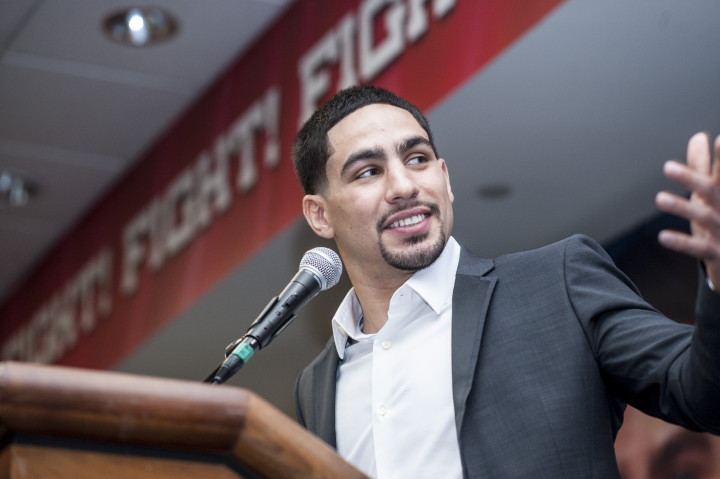
By Earl E: Lots of criticism has been thrown at Danny “The Swift” Garcia (32-0, 18 Kos) in his fight with not known contender Samuel Vargas (25-2-1, 13 Kos), because many boxing fans demand boxers should always engage in tough competitive fights in and every match.
As a boxing fan, I accept this idea, but as an individual that is pro-labor I disagree. If the boxer was to engage in a hard fight for every match, then how long will his career last? More importantly, how will his health be after retirement?
(Photo credit: Darryl Cobb/King’s Promotions/Premier Boxing Champions)
This is an individual contact sport and not a team sport. You simply can’t have an off night when engaged in a boxing match, as such is the case in basketball where if Stephen Curry just didn’t feel like giving his all that night, he can defer to his other skilled teammates to earn the win.
The boxer should make decisions based solely on the boxer’s interest rather than the fans, promoters, managers, trainers, albeit stakeholders that all “piggy-back” off the boxer’s labor. The true business managers align their interest with the boxer and follows the high pay/low risk strategy.
The life cycle of a boxer usually starts out at an early age, usually introduced to him by his father or a close relative. It’s not uncommon for boxers to be introduced to the sport as early as five years old and start to heavily invest in their craft by the time they are 8 years old, which is the youngest age a boxer can start competing in amateurs in the United States of America. By the time they are navigating their way through the amateurs, the expenses to engage in boxing have mounted up.
Fast forward years later, now that boxer is engaged in professional boxing. It’s no longer the same sport wherein a young boxer was a passenger in family minivan heading towards the local boxing tournament. It’s now a job, and the boxer now has to employ essentially independent contractors to look after his business, his brand. Let’s examine the independent contractors the boxer employs:
• Trainer: This is the individual that guides the boxer to excel in his craft. The trainer earns a cut of the boxer’s purse, which is usually 10.0%.
• Manager-The boxer needs someone to secure fights. In the USA the manager share has mandated maximum of 33.3% (mandated based on the Muhammad Ali Act) of the purse. However, most managers ask for about 20%. For academic sake let’s use 20%.
• Cutman/Cornerman-You don’t go to battle without this man. Even though this man doesn’t hold distinguished degrees, such as a doctorate in medicine, he has a special skill set. And, that’s stopping and reducing cuts and swelling, so that the boxer can continue with the fight. The cutman can get up to 3%.
• Taxes-The government without having to hold mitts, wrap a bandage, or negotiate a purse gets a 40% cut.
• Miscellaneous expenses-medical treatment, strength trainer, nutritionist, sparring partners. Again, for academic sake let’s say 5%.
I’m not a math guy, but let’s add up the percentages above and we get 78%. That’s 22% left for the boxer. If the boxer earned a $1M fight, he would take home $220,000.
Let’s use the boxer who earns $1M a fight. I won’t even go into the statistics of how many boxers actually earn a $1M per fight, but common sense tells us it’s a very low percentage indeed.
A boxer making at $1M per fight twice per year takes home $440,000 (that’s roughly the same salary as a “bench warmer” in the NBA). The goal here is to extend your career as long as possible so your earnings potential becomes much greater and not less, so if a boxer were to engage in hard fights then naturally their career shortens, because of the mental and physical demands of the sport. Do I get upset if a boxer negotiates a contract where he fights an easy opponent for $1M, and the next fight a non-risky journeyman and still gets paid $1M. Well, my answer is NO, I don’t get upset, and I agree with that business strategy, because the boxer is looking out for his interest to earn as much before he retires. It’s his physical and mental health in stake, not the trainer, the manager, the promoter, or the cutman. Furthermore, if a promoter is willing to pay that boxer high amounts without the boxer taking any risks, in my opinion, that’s financially smart. As a fan, I simply don’t watch, for example the Canelo vs. Liam Smith match. I couldn’t tell you if Canelo looked good, slow, strong, or whatever, because I didn’t watch it. I will also not watch Garcia fight the overmatched Vargas. Nonetheless, not watching the fight doesn’t make me dislike Garcia’s as a fighter or the decisions he makes for his best interests.
As I discussed earlier, by the time the boxer starts to earn $1M, that boxer has been in the game for 20 plus years and now it’s time to receive the fruits of his labor. I believe if you were related to this boxer and truly cared about him, then you would feel the same. You would advise him to make the most money in the sport with the less amount of risks as possible. That type of thinking is not far from our own. Most of us make occupational choices and business decisions based on longevity of the career, high earning capacity, so we can prepare for a retirement fund. Why should the boxer be any different?